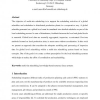Free Online Productivity Tools
i2Speak
i2Symbol
i2OCR
iTex2Img
iWeb2Print
iWeb2Shot
i2Type
iPdf2Split
iPdf2Merge
i2Bopomofo
i2Arabic
i2Style
i2Image
i2PDF
iLatex2Rtf
Sci2ools
IJAR
1998
1998
Multi-site scheduling with fuzzy concepts
The objective of multi-site scheduling is to support the scheduling activities of a global scheduler and schedulers in distributed production plants in a cooperative way. A global schedule generated on a global level must be translated into detailed schedules as part of the local scheduling process. In case of disturbance, feedback between the local and global levels is essential. Global level data are normally aggregated, imprecise, or estimated. Previous methods focused on local production sites, in most cases without coordination. In this work we present an approach that considers the adequate modeling and processing of imprecise data for global level scheduling within a multi-site scheduling system based on fuzzy concepts. One of the goals is to create a robust prescription for the local scheduling systems which helps to reduce the effort of coordination and rescheduling.
| Added | 22 Dec 2010 |
| Updated | 22 Dec 2010 |
| Type | Journal |
| Year | 1998 |
| Where | IJAR |
| Authors | Jürgen Sauer, Gerd Suelmann, Hans-Jürgen Appelrath |
Comments (0)

